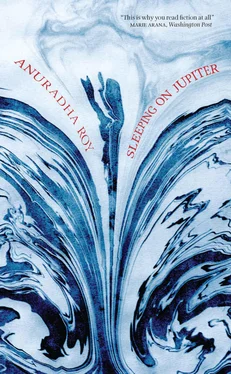At times he referred to no books at all but spoke of daily things — problems between children and parents, husbands and wives, the price of vegetables — and at the end of each story he had a moral or a teaching that some of the people there wrote down in notebooks.
Every now and then Guruji paused in his sermon and went into a trance while his audience sang hymns. He would come out of the trance after a few hymns and look directly into the eyes of someone in the audience and say: “They say there are windows from one heart to another. How can there be windows where there are no walls?” Or, “How can we claim to know God when we cannot know our closest friends? Every other being is a mystery to us and God is the greatest enigma of all.” He spoke to the person he had pinned with his eyes as if he were seeing right into them. Then he closed his eyes and was transported back into his trance.
At the end some people were in tears while others sat as if they had been turned to stone. I noticed a tall white-haired monk standing by the stage, looking at the twelve of us one by one. It was long ago, but I was sure he was the man who had spotted us when Piku and I had crept to the barbed wire fence that separated our part of the ashram from the other and Bhola had caught us.
When Guruji had left the stage after his discourse, the twelve of us were brought onto it. We had been told to smile and stand in a row holding the next girl’s hand. We could not see the people in the audience because there were bright spotlights on us. Piku stumbled as we went up onto the stage. After that she clutched my hand throughout with her own clammy one. Her head only came to my shoulders. I had grown taller, but she was still a tadpole.
Padma Devi told the audience that we were a few of the destitute children that Guruji had adopted as his own. She said we were fed, clothed, and went to school at the ashram alongside paying students. Padma Devi’s yellow hair and blue eyes looked brighter under the lights against her pink sari. Her lips twisted to one side when she spoke so her flat, shiny face went out of shape. She thanked the audience for their generous support and gifts of old clothes and books. The audience clapped and cheered, but I saw that all of us were looking at our toes. I wanted to run out and throw away my clothes and books and pens and pencils. I plucked at my frock with my nails. I hated the pink flowers on it and the green polka dots between the flowers. I hated my round-toed shoes and the ribbons in my hair. When I grew up I would run away from here and have so many new clothes that ten cupboards would not be enough to hold them.

By the next morning Vidya was well enough for toast and tea. But when she and Latika went to fetch Gouri for breakfast, she could not be found in her room: they knocked and waited, knocked and waited, then got the receptionist to open the room with a duplicate key. Gouri’s handbag lay on the coffee table. When they went through it they saw her purse was missing, as were her prayer beads in their cloth bag. Nothing else that they could see was missing.
“Those address cards!” Latika said. “She’s left them in her bag.”
She must not appear over-anxious. She had not told Vidya about finding Gouri utterly muddled, packed and ready to go to the station the day after they had arrived in Jarmuli. Now she was too scared to confess it. What if Gouri had actually left the hotel this time, thinking she had to catch a train? She said, “She must be in the hotel somewhere. She didn’t like her room, maybe she’s still nagging them to change it.”
Vidya replied, “I do all I can, what more could I have done? Look, two cards missing. What do you think that means?”
She sank down onto the bed. Perhaps she hadn’t quite recovered after all and her head was swimming because of her stomach trouble yesterday.
“Oh, what will we say to her son!” Latika said. “He didn’t want her travelling in the first place. He said so over and over, ‘She can’t be trusted alone any more, she forgets everything!’” What if Gouri became one of the missing whose grim, grainy faces one saw in black-outlined police advertisements in newspapers? And this wasn’t even the worst of the possible calamities.
“We ought to phone her son. .” Latika could see his bald, pompous face in her mind’s eye. His thin moustache and his jowls. The way he said, “I’ll try and make time, but I can’t promise,” whenever you asked if he could drop Gouri over on his way to work. The way he pursed his lips when called upon to smile.
“If that fellow had his way, Gouri would never leave the house at all. Remember what he said to me at the station?” Vidya put on a baritone. “So, Vidya Aunty, what mischief will you girls get up to on your wicked weekend, hmm?” She seemed to gather energy and resolve at the memory of his voice. “We’ll find her, wait and see.” She had dealt with many kinds of problems during her time in the bureaucracy, including an absconding typist.
They walked through their hotel describing Gouri to anyone they saw. They went into a satin-cushioned room they had never seen before which was called the Mumtaz Bar; they crossed the dining hall, the lobby, the corridors, the row of chairs around the bathtub-sized swimming pool, the strip of land in front with its evenly-spaced columns of coconut trees — Gouri was nowhere. Vidya interrogated the chowkidar at the gate, who in turn asked the ragged bunch of rickshaw-wallas parked there if any of them had ferried an old, stout, white-haired woman that morning. They even tried going through a set of latched doors to the kitchen, but they were stopped by an agitated waiter.
At the back of the hotel was a garden. Along its edge ran an earthen pathway pillared by palms. It ended in a low iron gate. They had not noticed the gate before, but now they saw it opened directly onto the beach. Stepping through the gate, they were confronted by the white and blue of ocean and beach in limpid morning light. Bare-chested fishermen were pushing wooden boats into the surf, chanting prayers together for luck. Women in fluorescent knee-high saris walked past in pairs and threes, with fish-baskets on their heads.
Vidya and Latika took their slippers in their hands and walked barefoot, scanning the beach for a round form in a sari. They passed a scent of cloves and ginger. Latika remembered the tea stall and turned around to find it, but as she turned she glimpsed someone who looked very like Suraj from the back. She grabbed Vidya’s hand to propel her the other way, babbling, “Look, they’re selling lobsters there. And crabs too. By those boats.” Upturned boats rose out of the sand like the carcasses of prehistoric animals. Latika pointed Vidya in their direction.
They hurried away, Vidya protesting. “If we walk this quickly, we’ll never find her. Slow down!” The tea-man’s morning song came to them in snatches, “The rain came again that night. And again and again and again.”
A familiar voice interrupted the song. “Awake at last. And I’ve been up and about since dawn! You should have seen the sunrise. Today I decided I would say my prayers out here by the sea.”
She was parked on the hull of an abandoned boat. Despite her prayer beads and white hair and bulk, Gouri looked more sinister than grandmotherly. She wore round sunglasses that they had never seen on her before, and a necklace of rose-pink pearls acquired minutes earlier from a vendor who was offering them identical strings now. She bared her teeth in laughter at their furious faces and the stark white of her dentures gleamed in the sunlight. “Oh come, come,” she said gaily. “I am not under house arrest here too, am I? And anyway, I have a stuffy old room, yours are much nicer.”
Читать дальше













